Both kiwi and weka wander freely along the forest trails at Russell Orongo Bay Holiday Park and a total of 55 different bird species have been identified there, making the park a fabulous destination for nature-loving holidaymakers. Owners, Tori and James Burns encourage visitors to ‘Experience, Encounter, Explore’ the beautiful surroundings and have a long-running predator control programme in place to help protect resident wildlife.
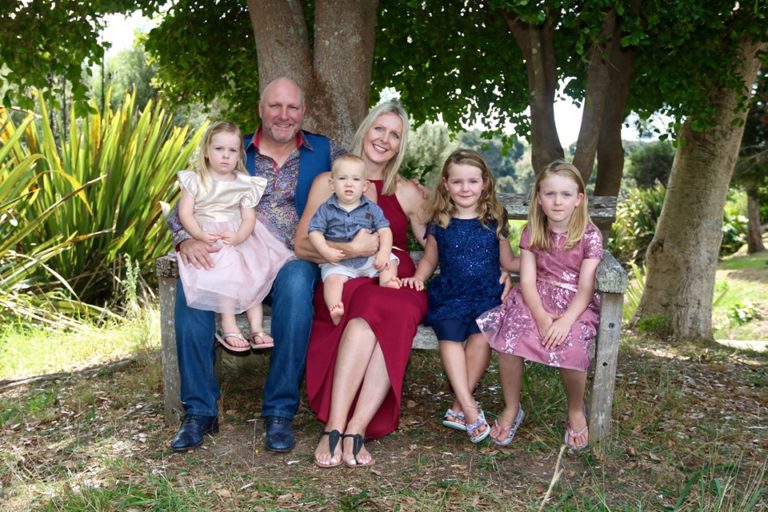
In recognition of their efforts, Russell Orongo Bay Holiday Park has just been announced as the winners of the Predator Free Park Award for 2019.
“We are extremely passionate about protecting the native flora and fauna at our Russell-Orongo Bay Holiday Park,” say Tori and James. “We work closely with Northland Regional Council, DOC and our local community in eradicating pests to protect the native birdlife and flora in the area. We have traps set in the 14 acres at our Park and we employ local business, Land and Habitat, to set and check traps.”
Dogs are welcome at the holiday park – but under strict conditions.
“We allow dogs to stay but we have very strict rules for dogs at the park, including keeping them on a lead and encourage kiwi aversion training for all dogs. We have a group of 30 special pest detection dogs booked in for December. These dogs are DOC Conservation Dogs and will be assessing predator numbers in the area.”
Russell Orongo has been part of the Predator Free New Zealand Trust holiday parks pilot programme since the beginning.
“We have bounced ideas off each other and they have put us in touch with some very useful contacts through Northland Regional council. We also support Project Island Song and we are members of the Ornithological Society of New Zealand (Birds NZ).”
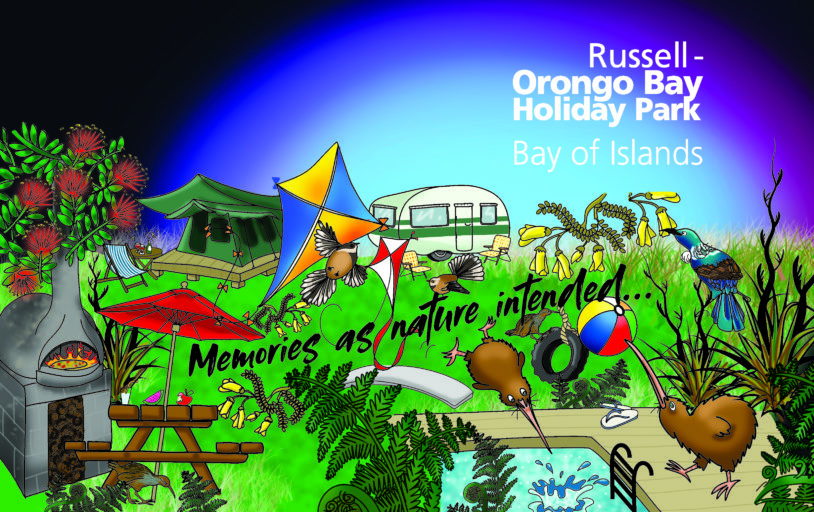
Tori and James and their staff have recently developed new branding for the park, reflecting the importance they place on protecting and enjoying the natural environment.
“We have developed new branding and taglines ‘memories as nature intended’ and ‘Experience, Encounter, Explore’. Our new illustrations highlight our native birdlife, flora and fauna at Russell Orongo Bay Holiday Park in a fun and informative way.”
James and Tori describe the predator free experience of visitors to Russell Orongo Bay.
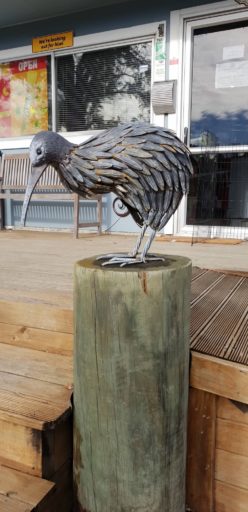
“When you arrive at Russell-Orongo Bay Holiday Park you are greeted into reception by our life size North Island kiwi bird sitting on a pillar outside and some signs telling you that ‘we’re looking out for kiwi’. On entering reception, a library of bird books is situated by the sofa for you to peruse and borrow if you are so inclined. A large predator free poster confirms our support of a Predator Free New Zealand and a large bird poster adorns the wall for easy identification of the birds. On another wall is a photo and feather of our famous weka that roam freely around the park. We tell you about the time the BBC came to film our cheeky little weka for a documentary (now found on You Tube — ‘Earth’s Mythical Islands’).
Watch out for those weka though – they have a well-deserved reputation for mischief.
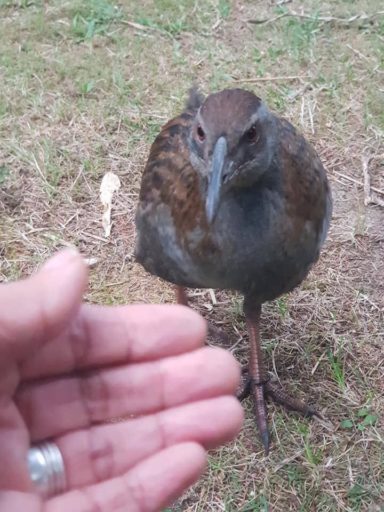
“We are often amused when a weka runs quickly past reception, beak overflowing after having stolen a sausage from a campers breakfast plate — a warning to keep your food safe!”
Tori and James and the holiday park staff encourage visitors to learn more about the birds and other wildlife they encounter on holiday.
“Don’t mix up the weka with a kiwi — we explain the main differences in both of these flightless birds, a weka is only spotted by day and the kiwi at night. The kiwi has a much longer beak and is larger and fluffier. You can see this by the feathers: the almost duck like feathers of the weka compared to the soft and fluffy feathers of the kiwi. Many people are surprised to learn that weka are more rare than north Island brown kiwi as they are frequently seen during the day as opposed to the kiwi which only venture out on the darkest of nights. We are fascinated by them, as are the many photographers who come to the park to photograph them.”
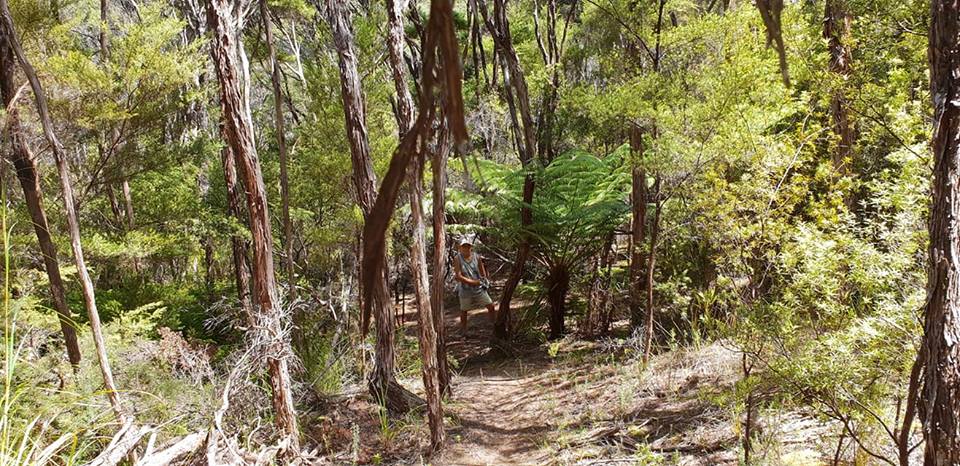
Visitors leave the office with a map of the park, with recent kiwi sightings marked and also some red cellophane (to the confusion of some).
“This is most important for viewing the kiwi at night and can be placed over your torch, in the absence of an infrared light,” Tori and James explain. “We teach our guests that kiwi don’t like bright white light!”
Kiwi and weka aren’t the only rare birdlife living at Russell Orongo Bay Holiday Park.
“We also point out to visitors, the other rare birdlife that happily live on our park, in particular the rare pateke ducks that live on our stream.’
Kiwi are reasonably common around the wider Russell area as Tori and James point out.
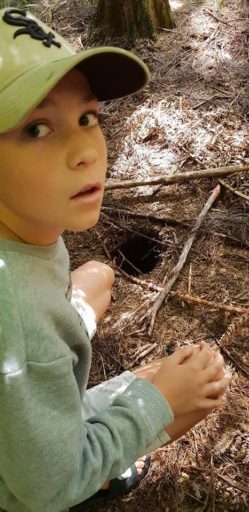
“Kiwi nesting boxes that are positioned in the 4-5 acres of bush land surrounding the park. Kiwi are prevalent in our area and we explain to our guests that this isn’t just by chance. Huge efforts go into the predator control on our park and also on the peninsula as a whole.”
A crowd slowly congregates around the computer speaker as Tori and James play their guests the sounds of some of the native birds.
“The kiwi is the most popular, from the shrill whistle of the male, to the grunts and pig like call of the female. We direct guests to the ‘backyardkiwi.org.nz’ website where they can replay these calls later on or maybe play the calls at dark to see if a kiwi responds.”
“Many of our European guests have a love for nature, that is one of the reasons they visit New Zealand – to experience our natural environment. For us to be able to offer an abundance of native birds and flora provides a memorable experience for them. Seeing and/or hearing a kiwi in the wild every night of your stay is a huge drawcard.”
The holiday park experience is popular with New Zealand families too.
New Zealand families living the city life are spending less time in nature. Research is proving that our tamariki are spending too much time indoors, on devices, in front of screens. Our ‘back to nature experience’ offers an alternative for families to bond, to listen and spot the birdlife and nature. They fish for eels in the stream, catch tadpoles, build dens, explore the bush and search for cave wētā. Families get to know our birdlife, they name the babies in spring and they return to see them growing up.”
With at least 55 species of birds identified in the park, it’s no wonder that it’s a popular destination for ornithologists as well.
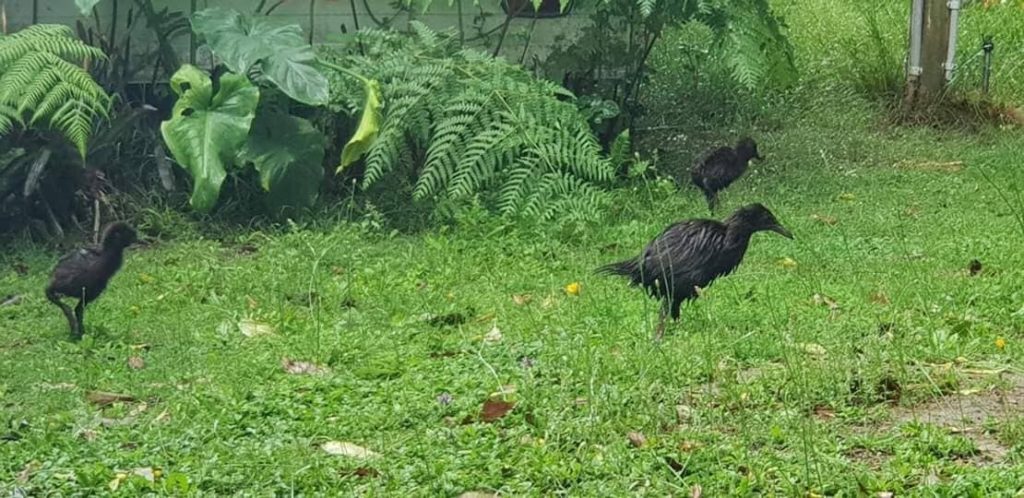
“We are so well known in the birding community that last year for the Ornthological Society’s conference based in Waitangi they had a break away workshop for 3 days where a group of ornithologists stayed at our park. They set up their mist nets and banded a variety of birds so as to track them around New Zealand. The children staying at the park were able to hold and release the birds.”
Both predator control and bird-friendly planting are carried out to foster the abundant birdlife.
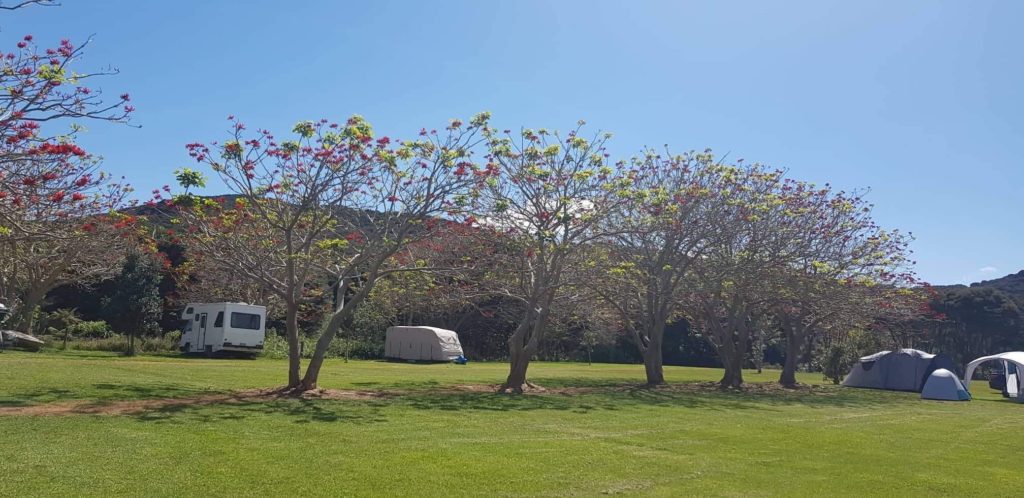
“There has also been a huge amount of research into the types of flora the birds are attracted to and these have been planted accordingly,” say Tori and James. “The tūī and kingfisher seem to love the Australian flame trees planted at the back of the park.”
Employees at the park are actively involved in planting programmes and protecting wildlife.
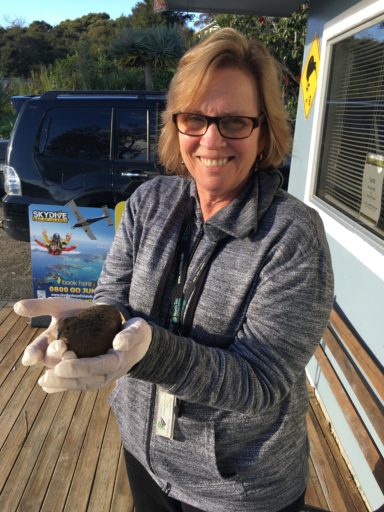
“Our employees are very much engaged in our philosophy of protecting and enhancing our natural environment. Our short and long-term projects keep everyone busy, involved and inspired. Ongoing projects include planting of native flora to attract native wildlife, checking traps, checking kiwi nesting boxes and future projects will include setting up the kiwi tracking camera for live streaming, recording and publishing the latest kiwi sightings on our new website.”
“Staff also organise scavenger hunts and bird spotting fun activities for kids, along with marketing of our Kaitiakitanga experiences, building lizard hotels, making bird feeders — there are projects for everyone to get stuck into. None of this would be possible without robust predator control that allows our natural environment to flourish.”

